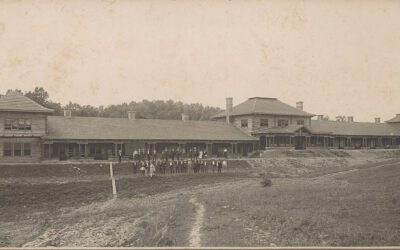On a mild afternoon in early May, the Linam Family Farm in Alma, Arkansas, smelled of honeysuckle and newly sprung grass. Rain earlier in the week had turned the Linams’ pastures into puddles, but the two acres of blackberries thrived on higher ground, their tender white flowers tiny moons against the green vines.
Chickens of varying colors moved in circles across the soggy ground, their tiny heads jutting before them as they stepped. Sheep stood in a group a few yards away, much too cool to be seen with a school of common poultry. Two guard dogs named Ranger and Bella barked. Soon, Ranger was at the gate, his head against the metal rungs, eager for attention. Bella, always the professional, stared at Ranger with disdain.
As Tiffany Linam walked from her nearby home, songbirds chirped as loud as windchimes. And those sheep in a huddle? They rushed toward her, making a “baa” noise that boomed like a cow’s bellow.
Both she and her husband, Chris, work full-time jobs. Chris operations an automotive diagnostics business from his home office. Tiffany is a psychiatric nurse practitioner.
Her routine goes like this. When she gets home, she changes into farm clothes and rubber boots. With her long black hair secured in a high ponytail, she heads for her stash of feed. The chickens, turkeys, and sheep recognize a shift in the day and walk alongside her, eager but not pushy. Well, except for one brown sheep, who marches and nudges as if she expected dinner five minutes ago. “She may have been a bottle-fed baby,” Tiffany said. “Those seem to be the only sheep that trust humans.” Trust, demand, whatever. The girl knows how the game works. And Tiffany loves her.
Tiffany loves all the animals—so much that when she and Chris learned that their livestock guardian dog, Bella, an Anatolian Shepard they’d rescued from a Kentucky farm, had a significant quirk, they decided to keep her. It wasn’t that Bella wouldn’t guard the flock. She’d once jumped so high she snatched a prowling chicken hawk out of mid-air. She took excellent care of her chickens but couldn’t resist their eggs.
“Eggs started going missing,” Tiffany said, “so we put out a trail camera to watch. Bella would wait for a hen to cackle [signaling she’d just laid an egg] and go in to get it from her.”
The Linams installed a diagonal crossbar in the chicken coop door, leaving enough room for the hens to come and go but far too little space for Bella to navigate.
Chris and Tiffany weren’t hardcore farmers until they moved from Fort Smith to Alma in 2020. Chris, who’d grown up with gardens but no livestock, wanted land with a pond. Tiffany, who’d grown up with chickens, guineas, and goats, saw no harm, so she agreed.
The land, just off U.S. Highway 71, was heavily forested. A ton of dirt work was necessary for them to carve out a farm and build a house. But the two had never shied away from manual labor. They’d spent most of their adult lives working hard during the day and enjoyed running and bicycling afterward. At the farm, their idea of a workout changed. Who needs a gym when wrangling sheep and stewarding a blackberry field? And fences? Don’t get Tiffany started. “Building fences is a medicine of sorts,” she said, channeling her Moment of Zen.
In 2020, while Tiffany and Chris were constructing their dark-gray, metal “barndominium”—Chris even built the custom cabinets throughout—they were also buying registered Dorper sheep. Today, they have other breeds as well, like the Hair sheep that sheds its coat once a year. In the pasture was a prime example: a girl who looked like she’d thrown on a fuzzy wrap that had slipped off one shoulder.
Learning on the fly was hard. Tiffany said, “We went about it wrong: fire, ready, aim. Chris broke his arm while we were building. He was hammering with a broken arm. Interest rates were rising, so we were trying to finish as fast as possible. And then we had chickens dying.”
Buffalo gnats were to blame. Tiffany took to a farming group on social media for help. It turns out gnats hate vanilla. “For the next year, my chicken coops were covered in vanilla-scented air freshers for cars.”
They bought bees, thinking they knew what they were doing. They did not. One of their first lambs didn’t make it. All but two of their first turkeys got picked off, one a night, and that’s when the Linams brought home Ranger.
One day, the Linams’ neighbor, Randy Arnold, came to call. Randy owns Arnold Family Farm Store and strawberry fields across the road. He and Chris discussed crops. When the talk was over, Chris knew he wanted to grow blackberries.
“They are a superfruit,” Chris said. “Plus, Randy had a contact with the extension office at the University of Arkansas. He introduced me to Dr. Amanda McWhirt. I put thought into this because Amanda discussed what it would involve in detail. When we tested the soil, we found it had the correct pH for blackberries.”
The University of Arkansas Division of Agriculture Research and Extension is a wonder regarding farming blackberries. They’ve developed forty-three thornless varieties, six of which Chris uses, and their genetic research is utilized around the globe. When Chris visited their farm, he marveled at the benefit of their expertise. “I had four doctors here for advice.”
When Chris started, he chose a rotating cross-arm trellis, which means the vines are on a system that allows easier, vertical picking on the shady side of the plants. It simplifies pruning, more air circulates, and the trellises lie flat when frost comes, allowing the Linams to cover their tender crop.
Nearby, a weather station alerts him of the dirt’s moisture content. Chris installed a well after his water bills soared to $1,000 for a single month last summer. He also has an irrigation system that allows for automatic fertilizing and uses as few chemicals as possible.
In early June, the Linams will open their farm to the public for about a month, testing their “you pick” model for the first time. Chris estimated the plants could produce as much as 10,000 pounds of fruit in their inaugural year of harvest.
Life on the farm has changed these city dwellers. A glass door in their bedroom gives them a view of the livestock. “The first thing I do in the morning is look out to ensure everyone is okay,” Tiffany said.
It might sound like a burden, like a tether to the land. After all, how do you leave a farm for even a weekend when so much depends on your presence? Tiffany sees it differently. “Living this way has helped me recognize how good nature is for mental health. Disconnecting from all the distractions. Watching lambs being born, tending to blackberries, and seeing them change over time.”
Tiffany suddenly remembered a story from her childhood in Texas. Their chickens were falling prey to an overnight predator, so her mother grabbed a lawn chair and her shotgun to stand guard for as long as it took. At the time, Tiffany complained that her mother loved the chickens more than her children. Now, Tiffany knows the lengths you’ll go to protect God’s creatures. It’s the solemn, unsung oath of every good farmer.
She and Chris found their place in the world. There are no neighbors nearby, no elaborate shopping centers, and no nightlife to speak of. On this farm, they’ve made their home. It is more than enough.
Linam Family Farm
7111 U.S. Highway 71
Alma, Arkansas 72921
Blackberry You Pick Days should begin around the first of June. For more information, follow the Linam Family Farm Facebook page or visit linamfarm.com.
WORDS Marla Cantrell
IMAGES courtesy Angela Miller Photography




